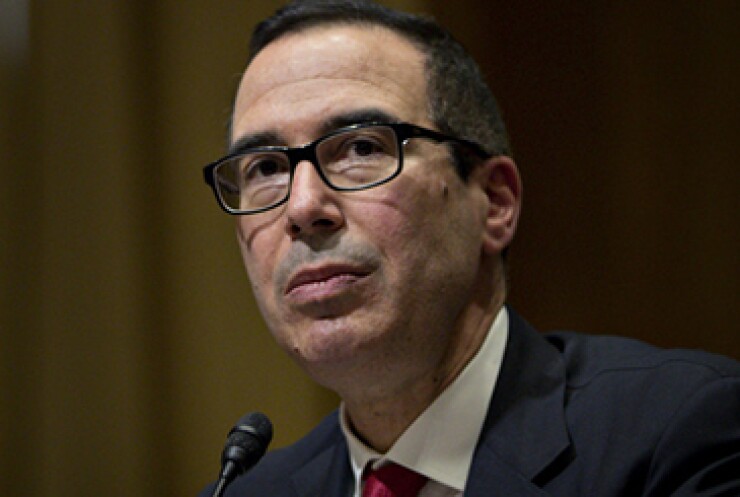
WASHINGTON — Former Treasury Secretary Steven Mnuchin is quietly trying to raise his ownership position in Flagstar Financial — formerly New York Community Bank — through his Washington, D.C.-based private equity firm and a number of family trusts, according to regulatory filings obtained by American Banker.
Mnuchin, through his investment firm Liberty Strategic Capital, in March led a group that
After that initial investment deal, Mnuchin's firm owned less than 10% of voting shares in New York Community Bank, below the threshold that requires investors to file a Change in Bank Control notice that can trigger more regulatory scrutiny.
But in an August regulatory filing with the Federal Reserve obtained by American Banker through a Freedom of Information Act request, Mnuchin and his firm asked the Fed if Mnuchin could more than double his indirect aggregate ownership stake in New York Community Bank.
Specifically, Liberty asked to convert non-voting preferred shares — which it obtained as part of the March investment deal — to common stock at the bank, according to the document, filed Aug. 23.
Should the Fed accept the proposal, Mnuchin, through his position at Liberty and at a number of other entities, including family trusts, would "indirectly control" up to 22.9% of voting securities at New York Community Bank, according to the document. Since the filing was made, the bank has
"Liberty has not increased its initial investment in NYCB," said Liberty spokesman Zach McEntee in a statement. "The filings you are referring to concern Liberty's conversion of non-voting preferred shares into common stock upon receipt of necessary approvals, not an increase in Liberty's overall investment."
The proposal immediately drew criticism from Sen. Elizabeth Warren, D-Mass., a leading voice on bank policy issues on Capitol Hill.
"Steve Mnuchin is using his private equity firm to suck the value out of NYCB and leave its customers — including low-income homeowners — hanging out to dry, just like he did with OneWest Bank," she said in a statement. "The Fed should deny this application."
The Fed declined to comment on whether or not the application has been approved.
Even should the application be approved, Mnuchin's controlling stake would fall below the 25% threshold that would require the investment firm to file an application to become a bank holding company — a move that could present problems with Liberty's other investments, as well as the imposition of capital requirements.
While private equity firms can convert preferred shares to common stock for a number of reasons, this particular case is closely watched because of Mnuchin's history in the banking sector.
He led an investment deal at IndyMac in the midst of the financial crisis. At least one of the key players who turned IndyMac (later renamed OneWest) around —
Mnuchin's potentially increased voting share at Flagstar has raised concerns among some observers that the same
"It's alarming that a man known for aggressive and abusive foreclosure practices in the wake of the Wall Street crisis is now an owner of a bank that's so important to low-income communities' interests," said Jesse Van Tol, president and CEO of the National Community Reinvestment Coalition. "I fear that Steve Mnuchin intends to run the same playbook for NYCB as he did at OneWest, with disastrous results for customers and communities."
Flagstar's circumstances, however, are very different from OneWest, said John Popeo, partner at the Gallatin Group, who previously led failed-bank deals at the Federal Deposit Insurance Corp.
"With the OneWest/IndyMac deal, I believe Mnuchin grew his stake over time after initially acquiring IndyMac," he said. "He was able to successfully leverage the distressed environment to make significant operational changes and profit from the turnaround."
Flagstar, by contrast, isn't in FDIC receivership, which makes getting that return on investment more challenging in the near term. Popeo said Mnuchin could be positioning himself for long-term acquisitions once regulatory pressures ease.
"Mnuchin likely sees potential for a turnaround at NYCB, where he can play a more prominent role," he said.
The proposal also raises larger questions about Liberty's ultimate influence over Flagstar, said Jeremy Kress, a bank law professor at the University of Michigan's Ross School of Business and former counsel to the assistant attorney general for antitrust at the U.S. Department of Justice. Kress questioned whether Otting — who was tapped to lead the firm as part of the 2024 investment deal led by Mnuchin — should be considered a representative of Mnuchin or Liberty.
"I think there are legitimate questions about whether Liberty exercises a controlling influence over New York Community Bank and Flagstar," he said. "In order to avoid presumptions of control, the Federal Reserve would have had to conclude that Joseph Otting, the CEO of New York Community, does not represent Liberty or Mnuchin — because if Otting did, under the presumptions of controlling influence, Liberty would have had to become a bank holding company."
In the application to the Federal Reserve, Mnuchin and Liberty say that they "have no plans to effect any significant change in the business strategy or corporate structure of NYCB or Flagstar or to liquidate, merge or sell the assets of either entity" as a result of the proposed stock changes.
"That statement could be read as inconsistent with the
Flagstar declined to comment.






